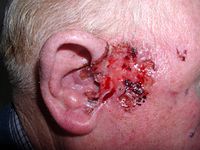
Photo from wikipedia
Introduction Aspergillus fumigatus (Asp) infections constitute a major cause of morbidity and mortality in patients following allogeneic hematopoietic stem cell transplantation (HSCT). In the context of insufficient host immunity, antifungal… Click to show full abstract
Introduction Aspergillus fumigatus (Asp) infections constitute a major cause of morbidity and mortality in patients following allogeneic hematopoietic stem cell transplantation (HSCT). In the context of insufficient host immunity, antifungal drugs show only limited efficacy. Faster and increased T-cell reconstitution correlated with a favorable outcome and a cell-based therapy approach strongly indicated successful clearance of fungal infections. Nevertheless, complex and cost- or time-intensive protocols hampered their implementation into clinical application. Methods To facilitate the clinical-scale manufacturing process of Aspergillus fumigatus-specific T cells (ATCs) and to enable immediate (within 24 hours) and sustained (12 days later) treatment of patients with invasive aspergillosis (IA), we adapted and combined two complementary good manufacturing practice (GMP)-compliant approaches, i) the direct magnetic enrichment of Interferon-gamma (IFN-γ) secreting ATCs using the small-scale Cytokine Secretion Assay (CSA) and ii) a short-term in vitro T-cell culture expansion (STE), respectively. We further compared stimulation with two standardized and commercially available products: Asp-lysate and a pool of overlapping peptides derived from different Asp-proteins (PepMix). Results For the fast CSA-based approach we detected IFN-γ+ ATCs after Asp-lysate- as well as PepMix-stimulation but with a significantly higher enrichment efficiency for stimulation with the Asp-lysate when compared to the PepMix. In contrast, the STE approach resulted in comparably high ATC expansion rates by using Asp-lysate or PepMix. Independent of the stimulus, predominantly CD4+ helper T cells with a central-memory phenotype were expanded while CD8+ T cells mainly showed an effector-memory phenotype. ATCs were highly functional and cytotoxic as determined by secretion of granzyme-B and IFN-γ. Discussion For patients with IA, the immediate adoptive transfer of IFN-γ+ ATCs followed by the administration of short-term in vitro expanded ATCs from the same donor, might be a promising therapeutic option to improve the clinical outcome.
Journal Title: Frontiers in Immunology
Year Published: 2023
Link to full text (if available)
Share on Social Media: Sign Up to like & get
recommendations!